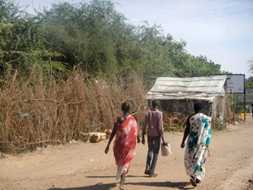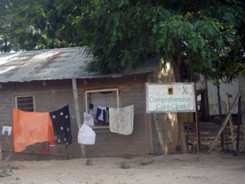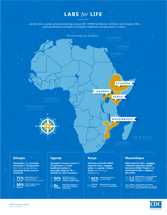Changing Lives in Kenya’s Kakuma Refugee Camp

Walking through Kakuma Refugee Camp
Hannah is a tall but frail Kenyan woman living in the Turkana district of northwest Kenya. Although residing in an area that is largely defined by Kakuma Refugee Camp, Hannah is not a refugee. However, her struggle is as daunting and nearly as difficult.
Taking advantage of the support the Kakuma Refugee Camp clinic offers to the surrounding Turkana community, Hannah was tested for HIV at the recommendation of a medical provider. She discovered that she is HIV positive and later found out that her entire family is also infected with the disease. Today, Hannah walks three hours each way with her small children to receive ongoing treatment and care at the camp. This care includes food rations, a necessary provision since Hannah has little money to feed her family and needs enough nutritional support to withstand the effects of the strong medications she and her children are taking.
A community in need
Since 2010, the Kakuma HIV/AIDS program, supported by CDC through the U.S. President’s Emergency Plan for AIDS Relief (PEPFAR), has been the sole HIV/AIDS program in this camp of more than 120,000 refugees. The prevalence of HIV among the 23,000 adults in the camp is 1.2% and the program reaches approximately 87% of those infected. Currently, funding provides support for the United Nations High Commissioner for Refugees (UNHCR) and its collaborator, the International Rescue Committee (IRC), to provide treatment, care, and counseling services to 244 refugees, as well as 266 members of the local Turkana community, like Hannah.
Range of services

Comprehensive Care Clinic in Kakuma Refugee Camp
The program also provides multifaceted prevention activities to hundreds of others. Services include condom distribution, HIV testing, voluntary medical male circumcision, the development of movies designed to raise awareness of the disease, and outreach to sex workers and men who have sex with men.
The program staff continues to look for new ways to best serve their population. After a journal article from the London School of Tropical Medicine and Hygiene revealed that high HIV viral loads were found in patients who had been on the same treatment for extended periods, IRC began testing viral loads in all patients enrolled in the program. Sixty-six percent of patients have had their medications adjusted in the past year as a result. The program has also focused heavily on capacity building for staff members to ensure that new discoveries in the field are implemented in their patient population.
Inspirational results
IRC Medical Director, Dr. Florah Bukania noted that one of the program’s greatest successes was evident this year: “For the first time, we have had no transmission of HIV from mothers to infants. In the past 18 months, 16 children were born to mothers with HIV and none of the babies were HIV positive. This is something very good that would never have happened without this program.”
In the midst of miles of dry soil and a blazing sun, thousands of refugees and local residents are benefiting from health services and prevention activities provided at Kakuma Refugee Camp.
Although Kakuma is a Swahili word meaning “nowhere,” the tremendous outcomes and services provided by IRC and UNHCR through this program are evidence that Kakuma is somewhere where hope for a better life is realistic – both in terms of finding a peaceful home and in improving health outcomes. Despite the distance she must travel, Hannah noted, “I’ve been coming here for seven years. I would tell someone else to come here too... my treatment is progressing well.”
Date: 2013
Kenya Country Profile
Labs for Life Infographic:

Get email updates
To receive email updates about this page, enter your email address:
Contact Us:
- Centers for Disease Control and Prevention
1600 Clifton Rd
Atlanta, GA 30333 - 800-CDC-INFO
(800-232-4636)
TTY: (888) 232-6348
24 Hours/Every Day - Contact CDC-INFO
 ShareCompartir
ShareCompartir


